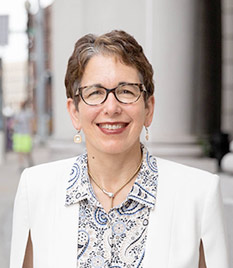Suffolk University is committed to making every member of our community feel welcomed, valued, and respected.
That commitment is real. It is more than words. I see evidence of it every day. Faculty and staff show that commitment in their daily work and in their dedication to the intellectual and personal growth of each of our students. But it’s also clear that despite that commitment, we don’t always succeed.
As you may know, one of our undergraduate students posted a blog entry last week that expressed her pain from feeling both invalidated and disrespected by a faculty member’s comments on an assignment. I sent a message to the community Friday stating that we take such concerns extremely seriously as a university. I take the concern seriously on behalf of the institution as the acting president, and I take it seriously as an individual personally committed to diversity and inclusion. The truth is that all of us here at Suffolk should be concerned about any student feeling this way.
So we must redouble efforts to create a more inclusive environment, while at the same time recognizing that everyone involved in any specific incident deserves a fair hearing.
We cannot truly live up to what we aspire to be as a university unless we foster an inclusive campus community where all of us are welcomed and valued no matter our sex, race, religion, culture, country of origin, disability status, sexual orientation, or gender identity. As individuals and as a community we can do better and need to always strive to do so. And we are not alone. As the outpouring of support for our student this week has shown, students, faculty, and staff continue to have experiences that cause them pain and anger. Regardless of the circumstances around any particular incident, we should recognize that many members of our community do experience bias, in ways both small and large. While all of society needs to improve in this regard, as an educational institution it is imperative that we lead the way.
Knowing this, we began to increase our focus this year on issues of diversity and inclusion. We hired a new assistant director in our Center for Teaching and Scholarly Excellence, Dr. Heather Dwyer. She has a deep interest and experience in issues of diversity and equity in higher education and has presented nationally on teaching diverse learners in the college classroom.
And we also hired a new director of our Center for Academic Access and Opportunity. Among other things, Dr. Joyya Smith will oversee the process of reapplying for TRIO grant funding, which includes the McNair Scholars program that provides support for first-generation, low-income, and underrepresented students who are interested in pursuing graduate study.
Approximately two weeks ago we distributed to all students, faculty, and staff a climate survey designed to help us better identify those areas in which we need to improve (The survey is still open so if you have not already responded, please do so before Nov. 10.) The survey will be analyzed by the Diversity Task Force, chaired by Dr. Micky Lee, associate professor in the Department of Communication and Journalism. It will inform a diversity strategic plan for 2017-2020.
We launched a three-part diversity workshop series for faculty this fall called “Leveraging Diversity and Navigating Identity.” Topics have and will include mitigating stereotype threat, teaching inclusively, and experiences of race in academia. Other open forums, talks, and initiatives have been planned. And we hired Dr. Lizette Rivera as director of Diversity Services, a critical office within our Student Affairs organization.
All of these initiatives will, I believe, help us to continue to become a more inclusive community. But last week’s incident has made clear that these steps are not enough. There is more we can do. The most immediate action we are working to organize is a microaggression training session for each academic department in the University. I have asked the Center for Teaching and Scholarly Excellence to work with the deans of each of our three schools to set up these sessions department by department. The training sessions will be required for all faculty at the institution over the course of this academic year, with planning and scheduling to begin immediately. Staff members will also be trained in the near future.
While these sessions will not make us perfect, it is my hope that through training and open dialog we will further foster a climate that is safe, supportive, and welcoming to all. I look forward to hearing any ideas that you may have about how we can continue to improve in this area.

Marisa J. Kelly
Acting President





Leave A Comment
I welcome two-way communication with the Suffolk Community. Faculty, staff, and students are encouraged to respond to posts, exchange ideas, share opinions, and offer feedback by logging in below using your regular Suffolk login (without "@suffolk.edu"). Comments should be made in accordance with standards of civil discourse, and we reserve the right to delete derogatory or inappropriate comments. log in